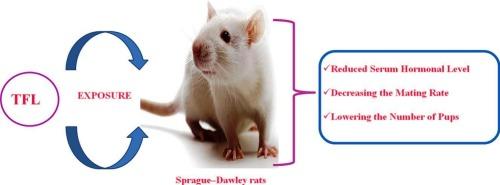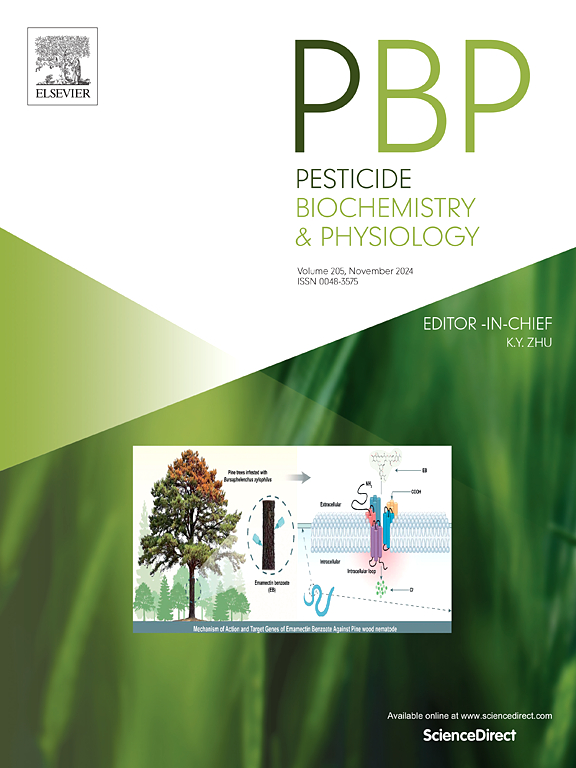Exploration of the transfluthrin effects on fertility and pregnancy outcomes: An in-vivo study in rat
IF 4.2
1区 农林科学
Q2 BIOCHEMISTRY & MOLECULAR BIOLOGY
引用次数: 0
Abstract
Transfluthrin (TFL) is a rapid-acting pyrethroid insecticide, commonly used worldwide, however its overuse and or misuse has been associated with adverse effects on human health. This study was designed to investigate the impact of TFL on fertility and pregnancy in Sprague–Dawley rats exposed orally and by inhalation. In this study, 48 adult Sprague–Dawley rats of 6–8 months age group were randomly selected with equal numbers of males and females. Each group was housed separately in a standard laboratory condition and their daily consumption of food and water, along with weight of each group were monitored. The blood was collected from each rat on 0 (zero) and 85th day of oral and inhalation exposure to TFL to determine the hormone levels by ELISA. The findings revealed that TFL exposure through oral and inhalation route reduced hormones level in serum such as testosterone, follicle-stimulating hormone, luteinizing hormone, progesterone, estrogen, and prolactin in both male and female rats. In conclusion, current research suggest the negative effects of TFL exposure on fertility, adversely affecting pregnancy outcomes, reducing the mating rate, and lowering the number of pups. It also stresses the significance of controlling its use to prevent any negative consequences.

探讨氟氯氰菊酯对生育力和妊娠结果的影响:大鼠体内研究
高效氟氯氰菊酯(TFL)是一种速效拟除虫菊酯杀虫剂,在全球范围内被普遍使用,但其过度使用或滥用会对人类健康造成不良影响。本研究旨在调查口服和吸入 TFL 对 Sprague-Dawley 大鼠生育和怀孕的影响。本研究随机挑选了 48 只 6-8 个月大的成年 Sprague-Dawley 大鼠,雌雄数量相等。每组大鼠在标准的实验室条件下分别饲养,并监测其每天的食物和水消耗量以及体重。在口服和吸入 TFL 的第 0 天(零天)和第 85 天,采集每只大鼠的血液,用 ELISA 方法测定激素水平。研究结果显示,通过口服和吸入途径接触 TFL 会降低雌雄大鼠血清中的激素水平,如睾酮、卵泡刺激素、黄体生成素、孕酮、雌激素和催乳素。总之,目前的研究表明,接触 TFL 对生育能力有负面影响,会对妊娠结果产生不利影 响,降低交配率,并减少幼崽数量。研究还强调了控制其使用以防止任何负面影响的重要性。
本文章由计算机程序翻译,如有差异,请以英文原文为准。
求助全文
约1分钟内获得全文
求助全文
来源期刊
CiteScore
7.00
自引率
8.50%
发文量
238
审稿时长
4.2 months
期刊介绍:
Pesticide Biochemistry and Physiology publishes original scientific articles pertaining to the mode of action of plant protection agents such as insecticides, fungicides, herbicides, and similar compounds, including nonlethal pest control agents, biosynthesis of pheromones, hormones, and plant resistance agents. Manuscripts may include a biochemical, physiological, or molecular study for an understanding of comparative toxicology or selective toxicity of both target and nontarget organisms. Particular interest will be given to studies on the molecular biology of pest control, toxicology, and pesticide resistance.
Research Areas Emphasized Include the Biochemistry and Physiology of:
• Comparative toxicity
• Mode of action
• Pathophysiology
• Plant growth regulators
• Resistance
• Other effects of pesticides on both parasites and hosts.

 求助内容:
求助内容: 应助结果提醒方式:
应助结果提醒方式:


